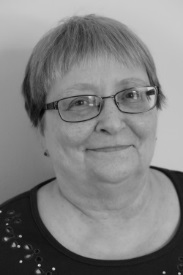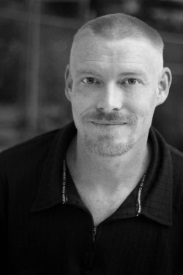Twisting Topeka (27 page)
Authors: Lissa Staley
Tags: #what if, #alternate history, #community, #kansas, #speculative, #library, #twist, #collaborative, #topeka

How do you make time for
writing?
I try to spend a little
time each day writing
something
, even if lately that’s
just a blog post or a quick piece of related fiction. It’s
important to get into a daily writing habit (something else
NaNoWriMo taught me) if for no other reason than it helps you get
past this idea of only being able to write when inspiration
strikes. Writing boils down to the simple equation of butt in chair
+ words on the page.
Betsy McGuire
Foreword

Betsy McGuire
has lived in Topeka more or less all her life,
reading all the time. When she retired it all started to come back
out. Her first novel, “In Raiment of Needlework,” is in revision;
she is in the middle of the next, “Reluctance,” a Jane Austen
pastiche. She has also written ghost stories. In her leisure time
she proofreads restaurant menus and public signage. She speaks
three languages and can repair holes in wool sweaters.
Why did you want to
participate in the Community Novel Project?
I like copy editing for the
Community Novel because it’s a way I can give back. I spell. Other
people have good hearing or nimble fingers or artistic vision, but
I can find an extra letter in a word or a misplaced punctuation
mark. Not a lot of entertainment value, but you’d miss me if I were
gone.
How do you make time for
writing?
I try to write every day in
the morning, but my health has made exercise the top priority. When
I can’t think, I sew. It helps me understand my
characters.
What’s the most important
writing advice you’ve received?
Write the crap. It’s
supposed to be bad. Don’t worry about the quality until the story
is written down. Why revise that scene when you may cut it anyway?
Get to the end, and then go back to the beginning.
What have you learned about
self-publishing from participating in this project?
I learned enough about
self-publishing this year to believe that I can almost do it myself
now- but that I need an editor to look before I do. Overall I feel
I’ve gone up a step, you might say.
Roxanna Namey
Shake, Rattle and
Roll

Short story fiction is a
favorite of
Roxie Namey
because the rapid character and story development
is ideal for filling small amounts of available writing or reading
time. When she is not being lazy, changing her hair or nails,
painting, or crocheting, the majority of her writing efforts have
been on short fiction pieces, mostly about and for family and
friends.
What have you learned about
writing fiction or self-publishing from participating in
this project?
The workshops provided this
year have been insightful. The speakers all had a multitude of
advice to share from different perspectives. As a person who writes
pretty much in solitude it is nice to hear how others go about
producing their works.
What is your writing
background?
Before retiring most of my
writing was for the government. Not as easy as one would think. I
took a correspondence course in the late 1980s on writing
literature for children and young adults. Since retiring, I have
written stories in formats from very short to novel length. Writing
short pieces has been my main interest. I can be quite lazy and am
better at writing something short and then spending a lot of time
rewriting.
What writing advice would
you share with other writers?
Write and then rewrite and
then rewrite and then rewrite... Always read your work out loud.
Get others to read and comment when possible. If you ask someone to
review what you have written, give them a clue about what you would
like from them in the way of feedback.
How do you make time for
writing? Do you write on a schedule, or write for a certain amount
of time each day, or do you only write when you feel
inspired?
Most of my writing happens
in my head. It seems I have an unlimited capacity for ideas which
far exceeds any minor writing talent I might possess. Once I settle
on one or two or three, I spend a lot of time just thinking about
what I want to write. I have a couple in the “thinking process”
which have been rumbling around for a couple of years. When an idea
ripens, I sit and write the draft very fast. Then I think about it
some more and rewrite. I repeat until I am happy with the
results.
What is your most memorable
moment from this year’s Community Novel Project?
Getting the feedback. Loved
it! I may not have always agreed with the comments, but all of it
was interesting and food for thought.
Vernon Neff
Black Blizzard

Vernon Neff
was born and raised in Louisville, Ohio. Joining
the Army straight out of high school he has had the honor of
service and traveling the world for 13 years before landing in
Topeka, Kansas where he still resides. He is married with four
amazing children who all have supported him through all of his
endeavors. Vernon is an artist and machinist, most well known
locally for interactive art installations featured at the NOTO art
walk and the 2015 interactive art exhibit “Fountains” at the Aaron
Douglas Art Fair. Vernon has the privilege to be a part of the
community novel with his piece, “Black Blizzard”, his first
publication.
Why did you want to
participate in the Community Novel Project?
I enjoyed the idea of getting to work
in a group and see how other people would look at the same
situations in different ways.
What real-life alternate or
speculative twist for Topeka do you anticipate or fear?
I fear just the breakdown of society.
There is so much tension between people now but what they don’t
realize is that if anything major ever were to happen the only way
we will make it is by working together.
What’s the most important
writing advice you’ve received? What writing advice would you share
with other writers?
I have learned that even the most
thought-out story in your head may not always make sense or
resonate with someone else and that it is much harder to rearrange
what you wrote to better help them understand your image. That
being said, what I would share with other writers is: be flexible,
write what you envision, and then take the feedback, knowing that
it only makes your story that much more amazing in the
end.
How do you make time for
writing?
When I need time to write I will find a
way to make time, I usually write when I need to separate myself
from the rest of the world. While I was deployed I wrote a lot, or
when I am feeling overwhelmed. It has always been an amazing
release.
What is your most memorable
moment from this year’s Community Novel Project?
Being as this was my first year
everything has been memorable and amazing. So much talent and
knowledge to learn from.
Craig Paschang
Tovarishch
O’Sullivan

Craig Paschang
is a full-time attorney and an occasional author
who lives in Topeka. He writes near-future science fiction and
promises to publish a novel, someday.
Why did you want to
participate in the Community Novel Project?
This year’s premise of collecting an
anthology of speculative fiction was too tempting to resist! I also
wanted to challenge myself to learn how to write short fiction,
which most novelists seem to agree is the most difficult form of
storytelling to execute successfully.
What was the inspiration
for writing your story?
I was inspired by the image of a Soviet
flag flying from the Statehouse. That idea grew into an
opportunity, without being partisan, to peek inside the building
and discover what might motivate someone to participate in a system
where putting Party and politics above all else becomes a way of
life.
What have you learned about
writing fiction from participating in this project?
Feedback is
so important
! I haven’t
circulated or workshopped any of my previous writing, and I’ve only
trusted a few close friends as beta readers. Letting my story go
out to a larger group for feedback was scary at first, but seeing
the wide range of responses, insights, and reactions to things I
never would have noticed on my own helped turn this story into one
that I am proud to share.
What is your writing
background?
I’ve participated in National Novel
Writing Month for the last five years and the Community Novel
Project for three. I write non-creatively for a living, so these
semi-annual creative outlets help keep me sane!
